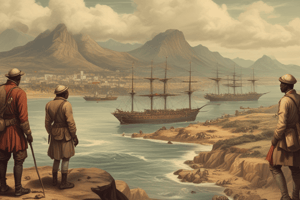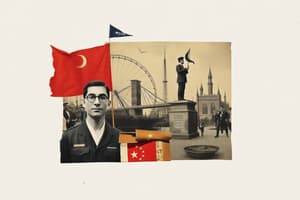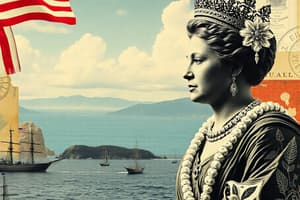Podcast
Questions and Answers
Which of these events significantly contributed to heightened Western influence in China?
Which of these events significantly contributed to heightened Western influence in China?
- The implementation of Dollar Diplomacy.
- The suppression of the Boxer Rebellion. (correct)
- The completion of the Panama Canal.
- The raids led by Francisco 'Pancho' Villa.
What was a primary consequence of the United States' involvement in the construction of the Panama Canal?
What was a primary consequence of the United States' involvement in the construction of the Panama Canal?
- The separation of Panama from Colombia. (correct)
- Reduced American economic interest in the region.
- Increased cooperation between Latin America and the U.S.
- The strengthening of Colombian governance.
The Roosevelt Corollary is best described as:
The Roosevelt Corollary is best described as:
- An agreement for mutual economic development.
- A justification for U.S. intervention in Latin America. (correct)
- An extension of Dollar Diplomacy.
- A rejection of the Monroe Doctrine.
Which U.S. foreign policy initiative under President Taft focused on using economic power to further national interests?
Which U.S. foreign policy initiative under President Taft focused on using economic power to further national interests?
What was the main outcome of the U.S. military expedition into Mexico in 1916, led by John J. Pershing?
What was the main outcome of the U.S. military expedition into Mexico in 1916, led by John J. Pershing?
What was the primary focus of Alfred T. Mahan's influential work?
What was the primary focus of Alfred T. Mahan's influential work?
Which action is William Seward most known for as Secretary of State?
Which action is William Seward most known for as Secretary of State?
What led to Queen Liliuokalani's removal from power?
What led to Queen Liliuokalani's removal from power?
What was Sanford Dole's role after the overthrow of the Hawaiian monarchy?
What was Sanford Dole's role after the overthrow of the Hawaiian monarchy?
Why did Pearl Harbor become strategically important to the United States?
Why did Pearl Harbor become strategically important to the United States?
What was Jose Marti's primary contribution to Cuban history?
What was Jose Marti's primary contribution to Cuban history?
What was Valeriano Weyler's role in Cuba before the Spanish-American War?
What was Valeriano Weyler's role in Cuba before the Spanish-American War?
How did yellow journalism influence the Spanish-American War?
How did yellow journalism influence the Spanish-American War?
What was a direct consequence of the USS Maine explosion?
What was a direct consequence of the USS Maine explosion?
What was the significance of George Dewey's victory in the Battle of Manila Bay?
What was the significance of George Dewey's victory in the Battle of Manila Bay?
Which of these statements best describes the Rough Riders?
Which of these statements best describes the Rough Riders?
What was a major outcome of the Treaty of Paris?
What was a major outcome of the Treaty of Paris?
Which of the following best describes the purpose of the Foraker Act?
Which of the following best describes the purpose of the Foraker Act?
What was the main effect of the Platt Amendment on Cuba?
What was the main effect of the Platt Amendment on Cuba?
What was the primary goal of the Open Door notes?
What was the primary goal of the Open Door notes?
Which of these descriptions best explains the American 'protectorate' model?
Which of these descriptions best explains the American 'protectorate' model?
Flashcards
Imperialism
Imperialism
The policy of extending a country's power and influence through diplomacy or military force, often involving the domination of one nation over another.
Alfred T. Mahan
Alfred T. Mahan
A naval historian who argued that sea power was key to a strong foreign policy, influencing American military planning and prompting a worldwide naval race.
William Seward
William Seward
An American politician who served as Secretary of State during the 1860s and was a strong advocate for American expansion. He is best known for negotiating the purchase of Alaska from Russia in 1867.
Queen Liliuokalani
Queen Liliuokalani
Signup and view all the flashcards
Sanford Dole
Sanford Dole
Signup and view all the flashcards
Pearl Harbor
Pearl Harbor
Signup and view all the flashcards
Jose Marti
Jose Marti
Signup and view all the flashcards
Valeriano Weyler
Valeriano Weyler
Signup and view all the flashcards
Boxer Rebellion
Boxer Rebellion
Signup and view all the flashcards
Panama Canal
Panama Canal
Signup and view all the flashcards
Roosevelt Corollary
Roosevelt Corollary
Signup and view all the flashcards
Dollar Diplomacy
Dollar Diplomacy
Signup and view all the flashcards
Francisco 'Pancho' Villa
Francisco 'Pancho' Villa
Signup and view all the flashcards
USS Maine
USS Maine
Signup and view all the flashcards
George Dewey
George Dewey
Signup and view all the flashcards
Rough Riders
Rough Riders
Signup and view all the flashcards
San Juan Hill
San Juan Hill
Signup and view all the flashcards
Treaty of Paris (1898)
Treaty of Paris (1898)
Signup and view all the flashcards
Foraker Act
Foraker Act
Signup and view all the flashcards
Platt Amendment
Platt Amendment
Signup and view all the flashcards
Protectorate
Protectorate
Signup and view all the flashcards
Study Notes
Imperialism
- Policy of expanding a country's power, often through diplomacy or military force, dominating other nations
- Significant global phenomenon in late 19th and early 20th centuries
- Major powers aimed to expand territories and influence
Alfred T. Mahan
- Naval historian, argued sea power was crucial for a strong foreign policy
- Influenced American military planning, spurred a worldwide naval race
- "The Influence of Sea Power upon History" had significant impact on global politics and naval strategies
William Seward
- American politician, Secretary of State in the 1860s
- Strong advocate for American expansion
- Negotiated the purchase of Alaska from Russia in 1867 (initially called "Seward's Folly")
- Alaska later proven to be a valuable acquisition
Queen Liliuokalani
- Last monarch of the Kingdom of Hawaii
- Overthrown in 1893 by American businessmen and plantation owners, with support from U.S. military
- Her overthrow was a significant step towards U.S. annexation of Hawaii
Sanford Dole
- American lawyer and jurist
- Became the first president of the Republic of Hawaii after the overthrow of the Hawaiian monarchy
- Served as first territorial governor of Hawaii after annexation by the U.S.
Pearl Harbor
- Naval base in Hawaii
- Became a key strategic location for the U.S. in the Pacific after U.S. annexation of Hawaii
- Famous for Japanese attack in 1941
Jose Marti
- Cuban nationalist leader and writer
- Played key role in Cuba's struggle for independence from Spain
- His ideas and writing inspired the Cuban revolutionary movement in the late 19th century
Valeriano Weyler
- Spanish general
- Known for brutal tactics in Cuba during Cuban War of Independence
- Harsh policies, including concentration camps, fueled anti-Spanish sentiment in the U.S.
- Contributed to American intervention
Yellow Journalism
- Sensationalist and exaggerated reporting style
- Prevalent in American newspapers during the 1890s
- Played a significant role in drumming up public support for the Spanish-American War
USS Maine
- American naval ship that exploded in Havana harbor in 1898
- Blamed on Spain, without clear evidence, served as a catalyst for the Spanish-American War
George Dewey
- American naval commander
- Led the U.S. Asiatic Squadron to victory over the Spanish fleet in the Battle of Manila Bay
- Crucial in establishing American control over the Philippines
Rough Riders
- Volunteer cavalry regiment
- Led by Theodore Roosevelt during the Spanish-American War
- Famous charge up San Juan Hill in Cuba became a symbol of American heroism and imperialism
San Juan Hill
- Site of a significant battle during the Spanish-American War
- American forces, including the Rough Riders, defeated Spanish troops
- Helped secure American control over Cuba
Treaty of Paris
- 1898 agreement that ended the Spanish-American War
- Spain ceded control of Cuba, Puerto Rico, Guam, and the Philippines to the U.S.
- Marked the emergence of the U.S. as a colonial power
Foraker Act
- 1900 law establishing a civilian government in Puerto Rico under U.S. control
- Key step in defining Puerto Rico's status as an unincorporated territory of the U.S.
Platt Amendment
- Set of provisions added to the Cuban constitution in 1901
- Gave the U.S. right to intervene in Cuban affairs and established a naval base at Guantanamo Bay
- Effectively made Cuba a U.S. protectorate
Protectorate
- Relationship between two countries where a stronger power offers protection to a weaker state
- Often involves significant control over the weaker state's foreign policy and economy
Emilio Aguinaldo
- Filipino revolutionary leader
- Fought against Spanish rule, later led the Filipino resistance against American occupation
- His capture in 1901 marked a turning point in the Philippine-American War
John Hay
- U.S. Secretary of State
- Author of the Open Door notes
- Played a significant role in shaping American foreign policy during the Age of Imperialism
Open Door notes
- Statements issued by U.S. Secretary of State John Hay in 1899 and 1900
- Called for equal opportunity for international trade in China
- Important aspect of U.S. economic imperialism in Asia
Boxer Rebellion
- Anti-foreign, anti-colonial, and anti-Christian uprising in China
- Between 1899 and 1901
- Suppressed by an international coalition that included the U.S.
- Further solidified Western influence in China
Panama Canal
- Strategic waterway connecting the Atlantic and Pacific Oceans
- Completed in 1914
- Major feat of American engineering and imperialism
- Involved U.S.-backed separation of Panama from Colombia
Roosevelt Corollary
- Addition to the Monroe Doctrine announced by President Theodore Roosevelt in 1904
- Asserted the U.S. right to intervene in Latin American countries to maintain stability and protect American interests
Dollar Diplomacy
- Foreign policy initiative under President William Howard Taft
- Sought to use American economic power to further U.S. interests abroad, particularly in Latin America and East Asia
Francisco "Pancho" Villa
- Mexican revolutionary general
- Led raids into the United States, prompting a U.S. military expedition into Mexico in 1916
- Highlighted the complexities of U.S. involvement in Latin America
John J. Pershing
- American general
- Led the Punitive Expedition into Mexico in pursuit of Pancho Villa
- Later commanded American forces in Europe during World War I
- Career exemplifies the transition of the U.S. from a regional to a global power
Studying That Suits You
Use AI to generate personalized quizzes and flashcards to suit your learning preferences.




